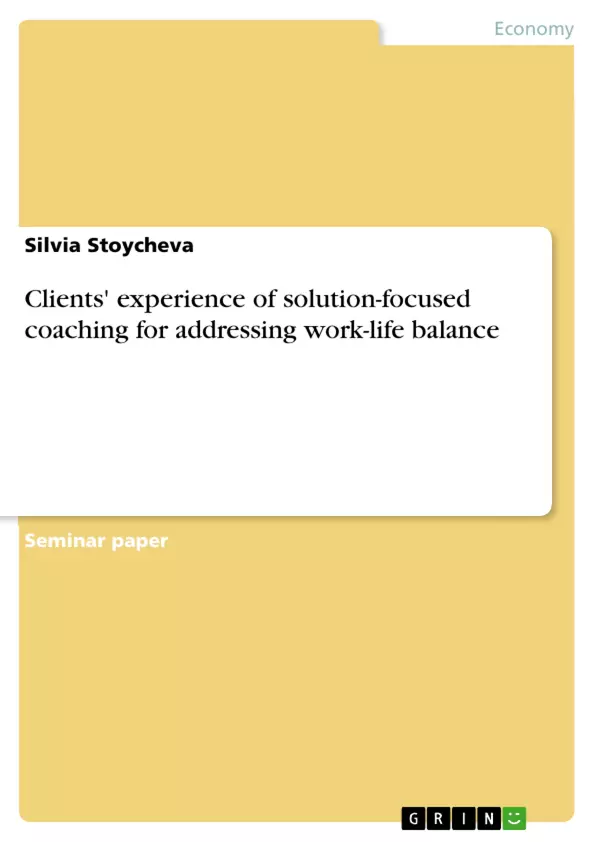The study reflects the clients' experience of solution-focused coaching. The purpose of this paper is to explore how clients are coping with work-life-balance issues after being coached with a solution-focused approach. Using semi-structured interviews and IPA analysis, this study examines the effectiveness of solution-focused coaching with eight professionals who have reported to experience work-life balance issues. There is a collective agreement about the efficacy of solution-focused coaching in relation to well-being and goal-attainment.
This study aims to research if the approach will have similar outcomes in regard to work-life imbalance. Three higher-order themes were identified: coachee's feelings after the session, experienced change and usefulness of defined solution-focused options. The themes help generate insight into how the clients experienced the coaching session and whether the approach has helped them achieve a work-life balance.
Inhaltsverzeichnis (Table of Contents)
- Abstract
- 1. Literature Review
- 1.1 Introduction
- 1.2 Work-Life-Balance
- 1.3 Solution-Focused-Coaching
- 2. Method
- 2.1 Design
- 2.2 Participants
- 2.3 Procedure
- 2.4 Data analysis
- 3. Results
- 3.1 Coachee's feelings after the session
- 3.1.1 Positivity
- 3.1.2 Motivation
- 3.1.3 Being in control
- 3.2 Experienced change
- 3.2.1 Mindfulness
- 3.2.2 Progress
- 3.3 The usefulness of defined solution-focused options
- 3.3.1 Installing new thought patterns
- 3.3.2 Separation of work and life domains
- 3.1 Coachee's feelings after the session
- 4. Discussion
- 4.1 Coachee's feelings after the session
- 4.2 Experienced change
- 4.3 The usefulness of defined solution-focused options
- 5. Limitations and Future Research
- 6. Conclusion
- References
Zielsetzung und Themenschwerpunkte (Objectives and Key Themes)
This study investigates the effectiveness of solution-focused coaching in addressing work-life balance issues. It aims to understand how clients experience this coaching approach and whether it helps them achieve a better balance between their work and personal lives. The research utilizes semi-structured interviews and IPA analysis to analyze the experiences of eight professionals who reported experiencing work-life balance challenges.
- The impact of solution-focused coaching on work-life balance.
- Client experiences and perspectives on the effectiveness of the coaching approach.
- The role of positive psychology in work-life balance interventions.
- Exploration of key themes and insights from the coaching sessions.
- Analysis of the potential benefits and limitations of solution-focused coaching in addressing work-life balance issues.
Zusammenfassung der Kapitel (Chapter Summaries)
- Abstract: This section provides a concise overview of the study's purpose, methodology, and key findings, highlighting the effectiveness of solution-focused coaching in addressing work-life balance issues.
- 1. Literature Review: This chapter explores the theoretical foundations of work-life balance and solution-focused coaching, reviewing relevant research and literature on the topic. It examines the concept of work-life balance, its impact on well-being, and the potential of coaching interventions to address these challenges.
- 2. Method: This chapter outlines the research design, participant selection, data collection procedures, and analysis methods used in the study. It explains how the research was conducted and the specific techniques employed to gather and analyze data.
- 3. Results: This chapter presents the findings of the study, highlighting the key themes identified through the analysis of interview data. It explores the coachee's feelings after the coaching session, the experienced changes, and the usefulness of the solution-focused options.
- 4. Discussion: This chapter provides a comprehensive analysis of the study's findings, discussing the implications of the results for the field of coaching and work-life balance. It explores the significance of the findings and their potential impact on practice.
Schlüsselwörter (Keywords)
The primary keywords and focus topics include solution-focused coaching, work-life balance, positive psychology, well-being, goal attainment, client experience, coaching interventions, and IPA analysis.
- Quote paper
- Silvia Stoycheva (Author), 2021, Clients' experience of solution-focused coaching for addressing work-life balance, Munich, GRIN Verlag, https://www.grin.com/document/1299506



